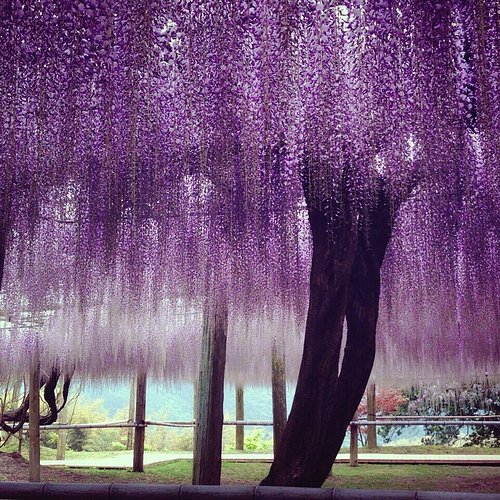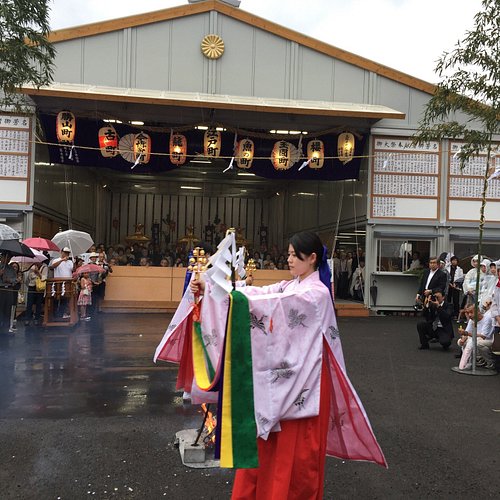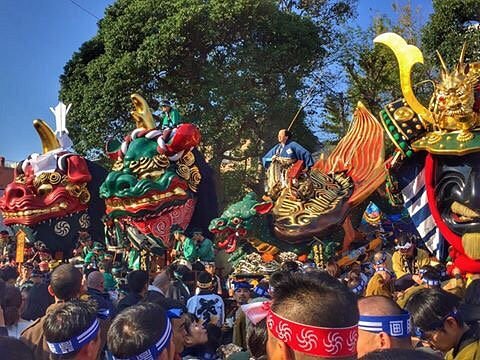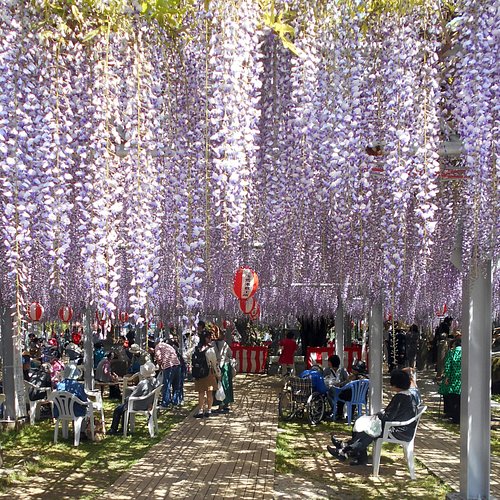10 Cultural Events in Kyushu That You Shouldn't Miss
Discover the best top things to do in Kyushu, Japan including Kitakyushu City Kawachi Fuji Garden Wisterias Blossom, Kitakyushu City Kawachi Fuji Garden Autumn Colors, Nagasaki Kunchi, Nagasaki Lantern Festival, Karatsu Kunchi, Hasami Ceramics Festival, Hakata Gion Yamakasa, Yanagawa Dolls’ Festival Sagemon Meguri, Nakayama Oto Festival, Fukuoka Castle Cherry Blossom Matsuri.
Restaurants in Kyushu
1. Kitakyushu City Kawachi Fuji Garden Wisterias Blossom
Overall Ratings
4.5 based on 241 reviews
In the spring, the Kawachi Fuji Gardens open their Wisteria tunnels to the public. Wisteria, lauded in Japanese poetry, bloom strongest between April and May. The Kawachi Fuji Wisteria are especially lovely, as the hundred-year old trees are arranged to blossom around domes and trellises, with clusters of flowers hang down in delicate rows, leaving only patches of streaming sunlight in between. The magical sight attracts visitors from all over the world. Over twenty species of Wisteria compose the two main tunnels, one 260 feet long, and the other 720 feet long. Each features an explosion of petals from lavender to deep royal purple, with bursts of pink, blue, and white in between.
Reviewed By kimitakas - Taichung, Taiwan
Kawachi Wisteria Garden is one of highlights for the sightseeing in Kitakyushu. The season is at the end of April and the beginning of May. To avoid the crowds, you should obligatorily book an entrance coupon at convenience store. On a less crowded day, that coupon is used as an entrance ticket. For a crowded day, you have to pay an extra fee at the entrance gate in addition to that coupon. To access the site, the most convenient is driving a car. Otherwise, you can take a public bus from JR Yahata station, and walk about half an hour. It is not bad, and even recommendable to walk, because the way to wisteria park is a very pleasant promenade.
2. Kitakyushu City Kawachi Fuji Garden Autumn Colors
3. Nagasaki Kunchi
Overall Ratings
4.5 based on 32 reviews
"Kunchi" is the local name in northern Kyushu for an autumn festival and it is dedicated to giving thanks for the harvest. It can also be written using a variety of kanji characters. "Nagasaki Kunchi" is the major autumn festival for the patron god of Nagasaki in Suwa Shrine, and is said to have been started when two prostitutes offered the Noh dance "Komai" in front of the shrine in 1634. The unique dedication dance is characterized by strong influences from other countries such as the Netherlands, Portugal, and Southeast Asia, and it has been designated as a National Important Intangible Folk Cultural Asset.
4. Nagasaki Lantern Festival
Overall Ratings
4.5 based on 99 reviews
This winter event in Nagasaki is held from the 1st through the 15th of the first month of the traditional Japanese calendar. The entire area centered on Nagasaki Chinatown is decorated with more than 15,000 vividly colored Chinese paper lanterns and various illuminated art objects both large and small. Originally a New Year festival celebrated by Chinese residents of Nagasaki, the scale of the celebrations was expanded in 1994, and it became famous nationwide. There are many events with a rich traditional Chinese flavor, including the dragon dances (a Chinese ritual to pray for rain), erhu ( a stringed instrument) concerts, Chinese acrobatics, Chinese mask shows, and the magnificent Emperor's Parade. It boasts as many as 1 million visitors.
Reviewed By CatherineBulg - Moscow, Russia
Amazing atmosphere, lots and lots (!) of colorful decorations, some of which are of grand scale! The decors in Chuo park were most spectacular, as well as those installed along the river! It all starts at the railway station of Nagasaki! You’ll need several hours just to see them all! Plus, don’t miss cultural events, such as Dragon dance and Chinese opera! I would recommend to stay in Nagasaki at least for two days to have enough time to enjoy the festival! If you can’t come there on weekend when parades take place, don’t get discouraged: we’ve been there in the middle of the week, and are very content with our two-days trip, because there are many other interesting performances and we could see and take pictures of lantern decorations without any disturbances. I was told by the locals that on weekends he Chinese Lantern Festival gets really crowded! We, on the other hand, had a unexpected experience to be almost only Westerners visiting on Tuesday and Wednesday. Very authentic! Besides, you can easily get nice and affordable lodging on weekdays. By the way, during the daytime, I would highly recommend visiting the Dejima island museum, temples and port!
5. Karatsu Kunchi
Overall Ratings
4.5 based on 23 reviews
"Kunchi" is the popular name for the autumn festival in northern Kyushu, which is a votive festival held to give thanks for the harvest. It can be written in several different ways in Japanese, meaning "offering day," "shrine day," or "ninth day." Karatsu Kunchi is a regular autumn festival held at Karatsu Shrine every year from November 2nd to 4th, and it has been designated an important tangible cultural property by Saga Prefecture and the national government. The highlight is the festival floats in the shapes of enormous fish, lions, and dragons. Made with a technique called ikkanbari which layers lacquer over papier mache, the gorgeous floats are vividly colored in crimson, blue, black, and gold. The festival floats bobbing along by lantern light at night are beautiful and magical, and the sight of the parade through the streets in the afternoon to chants of "Enya, Enya" is very impressive.
Reviewed By mag_ty - Singapore, null
Excellent festival occurring in November - the atmosphere is superb and invigorating! Worth the time and travel from Fukuoka if you are in Japan during the festival time!
6. Hasami Ceramics Festival
Overall Ratings
4.5 based on 34 reviews
The town of Hasami, Nagasaki is the center of manufacturing for the mass-produced ceramics called Hasami-yaki. The Hasami Ceramics Festival is held every year from April 29th to May 5th. More than 130 ceramics kilns and dealers in the town participate in the exhibition, and the main venue (the Yakimono Park square) is crowded with visitors buying ceramics in a wide variety of colors and shapes. There are also events such as pottery turning demonstrations and the chance to experience ceramic painting hands-on. There is plenty of parking provided during the event, and a free shuttle bus also runs between Arita Station and the festival venue.
7. Hakata Gion Yamakasa
Overall Ratings
4.5 based on 86 reviews
Held annually between July 1st and 15th, this is one of Hakata's signature festivals, along with Hakata Dontaku. There are various opinions concerning its origin, but many believe it started in 1241 when the monk Shoichi Kokushi sprinkled holy water to get rid of diseases. For this festival, floats similar to portable shrines called yamakasa are built up high with countless banners and dolls. For safety, the shoulder-carried floats called kaki yamakasa used for transporting people are three meters high. On the first day, cordoning ropes are dropped (a cleansing event in the style of the region) and the ritual of inviting deities into the yamakasa begins. On the 10th, the floats finally start their parade called the nagare kaki, and the festival really heats up.
8. Yanagawa Dolls’ Festival Sagemon Meguri
Overall Ratings
4.5 based on 33 reviews
Sagemon is a decorating custom originating in Yanagawa, Fukuoka Prefecture expressing a wish for sound health and decent suitors for girls. Red and white cloths are wrapped around bamboo rings to make seven ornaments each with seven strings, and then placed around two Yanagawa balls in the center. This total of 51 decorations signifies an old tradition of wishing for one more year of life when a normal life span was thought to be 50 years. The Yanagawa Dolls' Festival Sagemon Meguri is held from February to April, during which a number of events take place, including a doll festival, aquatic doll parade, and a festival in which paper dolls are floated down the river.
9. Nakayama Oto Festival
10. Fukuoka Castle Cherry Blossom Matsuri
Overall Ratings
4.5 based on 38 reviews
Maizuru Park is the former site of the Fukuoka Castle inner citadel, which bears a connection to Kuroda Yoshitaka. In spring, the Yoshino cherry trees and weeping cherry trees burst into bloom -- close to 1,000 of them -- and the Fukuoka Castle Cherry Blossom Matsuri is held from late March through early April. During the event season, a signal gun inspired by Kuroda's unique cannonry marks the start of the nightly illumination show. There is also a quiz rally held at the Korokan at Fukuoka Castle, exclusive openings of the Sakura Fureai Zoo, and other programs. Lastly, the Ohori Festival is a historical reenactment of a march of Kuroda's horsemen.










